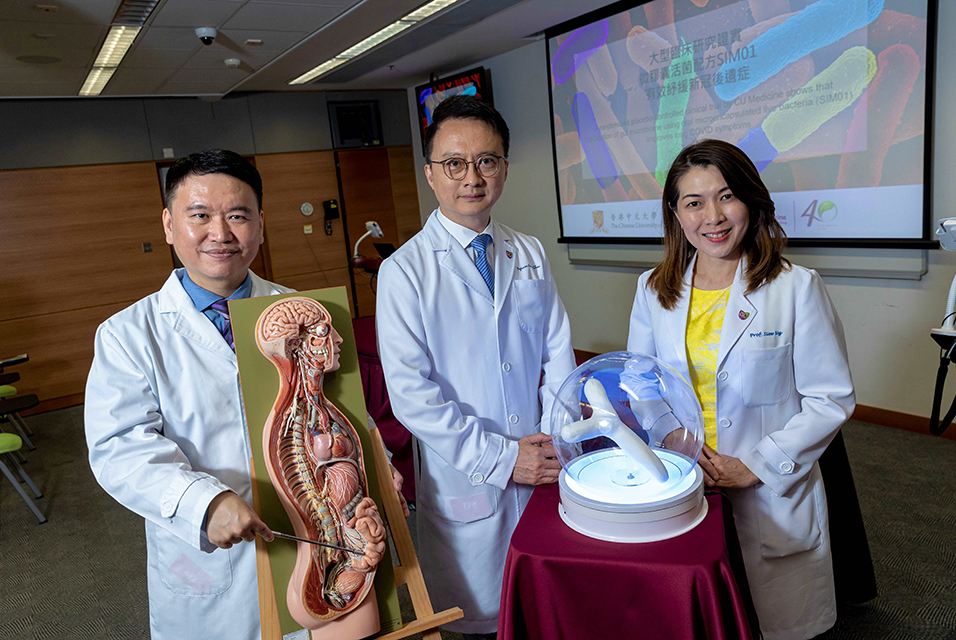HONG KONG.- 70% of patients in Hong Kong who have recovered from COVID-19 continue to suffer from at least one long COVID symptom at around 6 months. There is however no proven treatment for long COVID.
The Chinese University of Hong Kong’s (CUHK) Faculty of Medicine (CU Medicine) conducted a triple-blind, randomised, placebo-controlled clinical trial and showed that modulation of the gut microbiome using oral microencapsulated live bacteria (SIM01) developed by CUHK led to improvement in long COVID symptoms. Findings of the study were presented in May 2023 at the late breaking abstract plenary session in a world leading international conference (Digestive Disease Week 2023) in Chicago.
Urgent need to identify effective intervention for long COVID symptoms
Long COVID is defined as persistence of long-term symptoms beyond four weeks after the diagnosis of COVID-19. Professor Martin Wong Chi-sang, Professor in The Jockey Club School of Public Health and Primary Care at CU Medicine, stated, “Long COVID affects different organs and can be debilitating yet there is no effective treatment. There is an urgent need for clinically proven intervention to improve the physical and psychological impact of long COVID”.
Previous studies by CU Medicine have shown that patients with long COVID symptoms had altered gut microbial signatures. Modulation of the gut microbiota therefore represents a potentially useful intervention. The research team at CU Medicine used big data and machine-learning to invent the SIM01 microbiome formula and developed it into an oral formula using microencapsulation technology. Recently, they conducted a triple-blind, randomised, placebo-controlled trial (the RECOVERY study) to assess the efficacy of SIM01 in improving long COVID symptoms across multiple systems and organs.
From 2021 to 2022, a total of 463 recovered patients with at least one long COVID symptom joined the RECOVERY study. Their mean age was 49 years old and 65.4% were female. Nearly 70% of participants were suspected to have been infected with the Omicron variant. All subjects were randomly assigned to receive SIM01 or a placebo containing low dose Vitamin C for six months.
More patients who received SIM01 showed improvement in digestive and neurological symptoms
The researchers found that significantly more patients who received SIM01 than those who had placebo showed improvement in digestive problems, fatigue, difficulty in concentrating, memory loss and general unwellness at six months follow-up (see details in Table 1). Metagenomic analysis of their stool showed that SIM01 resulted in increased bacteria diversity, increased abundance of “favourable” bacteria and reduced abundance of “unfavourable” bacteria in the gut, highlighting the effectiveness of SIM01 in restoring gut dysbiosis.
Professor Siew Ng, CU Medicine’s Croucher Professor of Medical Sciences and Director of Microbiota I-Center (MagIC), commented, “To our knowledge, this is the first clinical trial to show that modulation of the gut microbiome can improve long COVID symptoms including memory and concentration problems. These data support the importance of the gut-brain axis. Restoring a healthy gut microbiota is a novel approach to improve neurological symptoms via the production of beneficial metabolites from gut bacteria that circulate to the brain to improve brain function”.
Professor Francis KL Chan, Dean of Medicine and Director of the Centre for Gut Microbiota Research at CU Medicine, concluded, “The development of conventional probiotics into a microbiome formula requires a lot of clinical data, metagenomics analysis, and microencapsulation technology. We will strive to develop more clinical applications of gut microbiome.”









